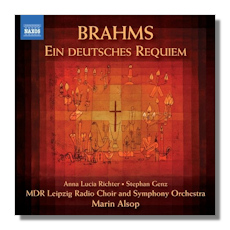
The Internet's Premier Classical Music Source
Related Links
- Brahms Reviews
- Latest Reviews
- More Reviews
-
By Composer
-
Collections
DVD & Blu-ray
Books
Concert Reviews
Articles/Interviews
Software
Audio
Search Amazon
Recommended Links
Site News
 CD Review
CD Review
Johannes Brahms

Ein Deutsches Requiem
Anna Lucia Richter, soprano
Stephan Genz, baritone
MDR Leipzig Radio Choir & Symphony Orchestra/Marin Alsop
Naxos 8.572996 64m
Marin Alsop has received high praise for her recent cycle of the Brahms symphonies with the London Philharmonic Orchestra on Naxos. Now she turns to the Brahms Requiem and produces one of the finest recordings of this work I have ever encountered. It is the briskest Brahms Requiem I know, with a timing of 64:13, marginally eclipsing Sir John Eliot on Soli Deo Gloria (64:54) and Philip Herreweghe on Harmonia Mundi (66:15). At the other end of the spectrum is the Christian Thielemann live video performance on Unitel Classica/C Major which clocks in at around 80 minutes, after deducting pauses, and opening and closing credits. There are a number of centrist readings by such conductors as James Levine. Claudio Abbado and Marek Janowski. Significant though tempo is in music, it is but one aspect of interpretation, and though I tend to favor brisk tempos in general, I must stress that you can't judge any musical performance by the stopwatch alone.
In this music brisk tempos generally suggest a brighter view of this work, which is of course a Requiem, not exactly a happy subject. In my review here of the Gardiner recording (Soli Deo Gloria SDG706), I noted the work's less dire view of dying and the conductor's brighter take on the music. Alsop is similar in her approach, imparting both an energy and warmth to the character of the music. The opening movement, Blessed are they that mourn, is very briskly paced and has a consoling character of great beauty. The concluding panel, Blessed are the dead, is similar in mood but brighter and more uplifting, especially as heard in the soaring tones of the chorus here. In between Alsop delivers each movement with conviction, capturing this more gentle, more Lutheran take on death and Resurrection. The crucial ending of #3, Lord, make me to know mine end, comes across as convincingly in its exciting and epic character here as in almost any other performance.
Alsop's soprano and baritone soloists are both quite fine. Young Anna Lucia Richter, only twenty-three years old at the time of this April 2013 recording, is splendid in #5, And ye now therefore have sorrow. True, sometimes her tone thins out a bit, but overall she has a beautiful voice and sings the text with total commitment. She should have a major career ahead of her on the concert stage and in the world's leading opera houses. Stephan Genz may not be as commanding in #3 or #6 (For here have we no continuing city), but he nonetheless acquits himself quite well overall.
The chorus sings splendidly throughout, very nearly reaching to the high levels of choral singing achieved in the Gardiner recording. The sound reproduction by Naxos is vivid and powerful. In general, I can opine that Alsop has fashioned an excellent performance of the Brahms Requiem to compete with the very best recordings available. Beside the Gardiner, I have reviewed the aforementioned Thielemann DVD here (Unitel Classics DVD 703308), as well as the Janowski SACD (Pentatone Classics 5186361), and I found them both of considerable merit. So, what's my recommendation? Gardiner, I believe, holds a slim edge, but the Alsop CD is very compelling on nearly all levels: it offers a spirited and incisive interpretation, fine orchestral playing, beautiful and committed singing by the chorus, and the angelic voice of rising star Anna Lucia Richter. Brahms mavens will certainly want this recording, and for that matter, so will mostly anyone with an abiding interest in choral music from the Romantic era.
Copyright © 2013, Robert Cummings





















